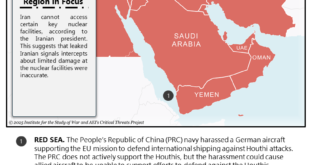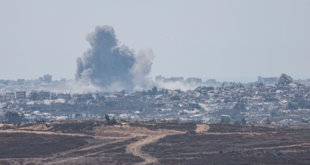 GAZA CITY, Gaza Strip (AP) – Prime Minister Ismail Haniyeh of Hamas faces the task of forming a new Palestinian government with the moderate Fatah, despite unresolved internal disputes and the warning of a U.S. boycott.
GAZA CITY, Gaza Strip (AP) – Prime Minister Ismail Haniyeh of Hamas faces the task of forming a new Palestinian government with the moderate Fatah, despite unresolved internal disputes and the warning of a U.S. boycott.
In quick succession Thursday, Haniyeh and his Hamas-led government resigned and President Mahmoud Abbas of Fatah appointed him to form the new team, based on last week’s agreement in Mecca to split power between the two rivals.
Haniyeh has five weeks to put together a government. He will have to overcome nagging disputes over the vital Interior Ministry – which controls the security forces – and whether a separate Hamas militia will continue to exist. For now, the two movements agreed to sweep the disputes under the rug.
But international issues won’t go away. The Palestinian Authority has been bankrupted by a Western aid boycott aimed at Hamas and listed as a terror group by the U.S., EU and Israel. They demand that any Palestinian government recognize Israel, renounce violence and accept previous peace accords.
The Mecca agreement falls short, and Abbas aides said U.S. officials made it clear that Washington would boycott the emerging Palestinian government.
In an interview on Palestinian TV late Thursday, Abbas told his people that the boycott would not be lifted right away, but “we will fight and struggle, and we hope this can be accomplished soon, though there are still obstacles.”
Abbas also said the letter appointing Haniyeh to form the government implicitly backs peace talks with Israel, run by Abbas’ PLO.
In Washington, State Department spokesman, Sean McCormack would not confirm the report of a possible U.S. boycott, saying only that the U.S. will not judge a Palestinian government until it has been formed, and that its performance would be reviewed.
The international demands have put Abbas in a bind. Had he pulled out of the deal with Hamas, he could have been branded a traitor by his people, become increasingly ineffective and triggered more factional fighting. Since May, more than 130 Palestinians have been killed in Fatah-Hamas clashes.
In moving forward with the new partnership, Abbas will likely deepen the Palestinians’ isolation.
On Wednesday evening, Abbas received a phone call from Assistant Secretary of State David Welch, who said the new government’s platform was not satisfactory, said Abbas aides, speaking on condition of anonymity because they were not authorized to discuss the issue. Welch said the U.S. would not deal with any members of the new government, including those from Fatah and independents, the aides said.
Jacob Walles, the U.S. consul general in Jerusalem, then delivered the same message to Abbas in person in a meeting at his headquarters in the West Bank town of Ramallah on Thursday, they said. The mood was tense, and Abbas’ advisers said they were worried about the future.
Stacy Barrios, a spokeswoman for the consulate, confirmed that the meeting took place but would not disclose details of the talks.
Fatah spokesman Abdel Hakim Awad said Saudi Arabia would be the guarantor of the agreement “because of the influence it has in the international, Arab and Islamic arenas.”
Abbas will meet on Saturday with Welch and on Sunday with Secretary of State Condoleezza Rice, in part to try to persuade them to change their position, the Abbas aides said.
The meetings will also help prepare for a three-way summit – Rice-Abbas-Olmert – in Jerusalem on Monday. The summit was initially billed as a step toward resuming peace talks, frozen for more than six years, but will now likely be overshadowed by the disagreements over the Palestinian government.
 Eurasia Press & News
Eurasia Press & News


